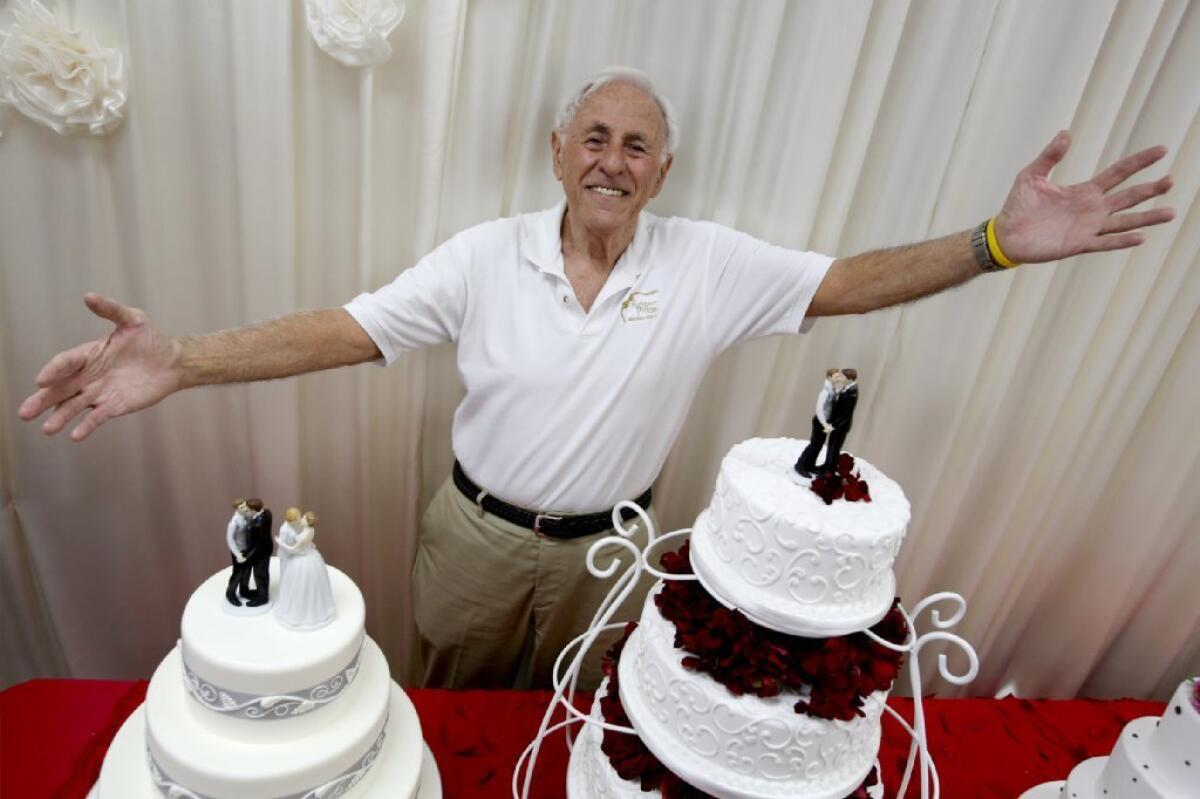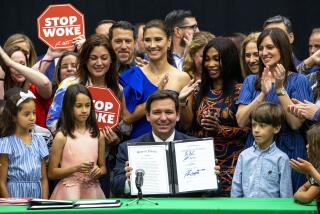Opinion: Weddings, religion and free speech

After a storm of protest from supporters of gay rights and the business community, Indiana and Arkansas have revised their Religious Freedom Restoration Acts. But it still isn’t clear whether bakers, caterers and photographers that have religious objections to same-sex weddings can withhold their services from such celebrations.
The tweaked Indiana law says businesses may not deny service on the basis of sexual orientation or gender identity, but some caterers, photographers and pizza purveyors insist they are happy to serve gays and lesbians and same-sex couples. They draw the line at facilitating/endorsing a ceremony they consider sacrilegious. (If a gay couple wants pizza for a New Year’s Eve party, no problem.)
Is refusing to bake or embellish a wedding cake for a same-sex ceremony discrimination on the basis of sexual orientation, or simply a refusal to participate in -- and endorse the message of -- an activity? And is requiring someone to sell cakes or pizzas to a same-sex wedding really a “substantial burden” on their free exercise of religion? We may find out as the Indiana law and others are tested in court.
Meanwhile, it’s worth noting that freedom of religion isn’t the only legal weapon that potentially can be wielded by people in the wedding business who don’t want to be complicit in same-sex nuptials.
It’s widely believed that the political genesis of the Indiana RFRA was concern that anti-gay-marriage merchants would suffer the fate of Elaine Huguenin, a wedding photographer in New Mexico who didn’t want to take pictures of a female couple’s commitment ceremony. The couple complained that Huguenin’s refusal violated a state law against discrimination on the basis of sexual orientation, and the state’s Human Rights Commission and Supreme Court agreed.
Huguenin tried several arguments. She said she wasn’t really discriminating on the basis of sexual orientation, but the court rejected the distinction she tried to draw between sexual orientation and “conduct so closely correlated with sexual orientation.”
She also cited New Mexico’s RFRA, but the court said that the religious-freedom law applied to only situations in which the government was a party not to disputes between private individuals. (Not very persuasively, the court said that the legislature and a court were not government agencies.) Interestingly, the Indiana RFRA made it clear that it would apply “regardless of whether the state or any other governmental entity is a party to the proceeding.”
So much for Huguenin’s religious-freedom arguments. But she made another claim based not on religious freedom but on another right enshrined in the 1st Amendment: the freedom of speech. As the New Mexico Supreme Court put it: “Elane Photography [the name of Huguenin’s business] concludes that by requiring it to photograph same-sex weddings on the same basis that it photographs opposite-sex weddings, the NMHRA unconstitutionally compels it to ‘create and engage in expression’ that sends a positive message about same-sex marriage not shared by its owner.”
The New Mexico Supreme Court wasn’t impressed by this argument, and neither, apparently, was the U.S. Supreme Court, which declined last year to hear Huguenin’s appeal. But the issue could arise again.
The free-speech argument is arguably stronger than the religious-freedom claim. For one thing, it’s rooted not in a statute but in the 1st Amendment, which the Supreme Court in other cases has interpreted to prohibit “compelled speech.” (Perhaps the most famous example is the 1943 ruling in which the court held that a state couldn’t require schoolchildren to salute the American flag.)
The compelled-speech argument would apply to situations other than the catering or photographing of a same-sex wedding. As the L.A. Times noted in a 2013 editorial about the Huguenin case:
“No one would dream of requiring a Democratic speechwriter to work for a Republican politician. So what about a wedding photographer? Huguenin’s lawyer told the Supreme Court that ‘Huguenin, and not her customer, is the speaker communicating through her photographs and books. Her actions in choreographing, capturing, selecting, editing, producing and arranging the final photographs and storybooks all affect, and ultimately determine, the messages conveyed through her images and books.’ Not all wedding photographers imbue their work with a distinctive point of view, but many do.”
One problem with the “compelled speech” approach is that it arguably privileges people who are in the business of crafting distinctive words and images – the “creative class.” It wouldn’t protect the humble cook who makes the same pizza for a frat party, a Boy Scout jamboree and a wedding.
But requiring someone to sell the same pizza to all comers isn’t the same as making someone articulate a message. So whether your legal yardstick is free speech or freedom of religion, delivering those pies to the wedding reception isn’t a “substantial burden.”
Follow Michael McGough on Twitter @MichaelMcGough3
More to Read
A cure for the common opinion
Get thought-provoking perspectives with our weekly newsletter.
You may occasionally receive promotional content from the Los Angeles Times.







